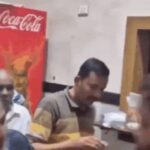This is an audio transcript of the Life and Art from FT Weekend podcast episode: ‘Culture chat — “Love is Blind: UK”’
Lucinda Smyth
Welcome to Life and Art from FT Weekend. I’m Lulu Smyth, in for Lilah Raptopoulos, and this is our Friday chat show. Today we are talking about Love is Blind: UK. For the uninitiated, Love Is Blind is the hit reality Netflix show in which strangers flirt through a wall. They spend several weeks in quote unquote, blind pods and can only meet in person after they are engaged. Netflix released the first season of the American show in 2020, and since then there have been several international versions. This is the first UK season of Love Is Blind, and today we’re going to talk about it. I’m Lulu, I’m coming to you through the airwaves, sight unseen. And I’m just doing this for the fame. Joining me from the pods, also known as the London studio, we have HTSI’s deputy editor. He is also a funeral director in his spare time. But don’t worry, he’s not going to embalm you. It’s Louis Wise. Hi, Louis.
Louis Wise
Hi. How are you?
Lucinda Smyth
Also with me, she’s been gratitude-journaling ahead of this episode, it’s the FT Magazine’s food and drink editor and recent guest host of this podcast, Harriet Fitch Little.
Harriet Fitch Little
Hello. I’m so happy to be here so we can torpedo our professional reputation.
Lucinda Smyth
We’re doing a public service. So let’s get into the show. I should also say this is the first time that we’re doing a reality show on this podcast. So, yeah, I am excited and anxious.
Harriet Fitch Little
You made it happen.
Lucinda Smyth
Finally, it’s come to light. The first four episodes were released on the 7th of August. And this Wednesday, Netflix released four more. But in order to avoid spoiling anything that’s happened in the last day and a half, I think we’ll just stick to that first batch of episodes, one to four. Harriet, top line, what do you think of the season so far?
Harriet Fitch Little
Well, I think this is a fundamentally very silly show and coming here to talk about it, it’s awesome to do something that I would never normally do, which is actually try and learn the names of the people on the show who’s, you know, I sort of resent and have tried to get around by doing huge printouts of the entire cast from MarieClaire.com. I mean, Love is Blind is silly. It’s fun. We essentially get to watch people who are vaguely compatible and, you know, definitely attractive. That’s the baseline. Even though they can’t see each other.
You know, the sort of agreement with the producers is everyone here is going to be in some way conventionally hot, you know, don’t worry, wink, wink. And we get to see those people flirting with each other, then, you know, falling in quote unquote, love and then moving on to the outside world. But the episodes we’ve watched so far, we actually only see the first part of that equation, which in my view, is the least interesting part, because what you’ve got is a series of identical side-by-side pods and, you know, people sort of trooping into it.
They go in like soldiers going into battle. And then the men on one side sort of raise their glasses to each other, and the women, like, wink at each other on their side. They’re all quite interchangeable. I personally love the bit of the show from watching the US seasons when they get out into the real world, so they’ve made the commitment to get out of the pods. You’ve got to get engaged, say that I love you. I think they really do have to say that I love you. I think the producers probably insist on that. And then they go on a honeymoon and they live together. And for me, that’s the bit that will sort of decide whether this was a good season or not. I sort of can’t say yet.
Lucinda Smyth
Louis, what do you think?
Louis Wise
I know what you mean. I mean, I enjoyed it. I think, yes, for the uninitiated, the series completely spirals and gets more and more demented, which is amazing. Obviously, you’re more and more invested in the couple. But I find the pods kind of grimly fascinating because there is this element of, yeah, it’s basically, are these people connecting and falling in love without seeing each other? And it definitely is quite literally static. There’s lots of lounging around on bright sofas, drinking from their notorious golden goblets, so it’s great that it moves out.
But also there’s slightly heartbreaking bits. There’s the man who chooses between two women and he kind of really interestingly picks one over the other because he doesn’t feel he has a sexual attraction to one only through the voice, which is in itself so interesting. And perhaps I could kind of get it and see it, but it was kind of awful, this poor woman, and he kind of says it to her in as many words. So yes, it’s morally reprehensible, but the whole thing is engineered to kind of build to a kind of crescendo of madness. And definitely this is only the beginning. That’s true.
Lucinda Smyth
Yeah. And have you . . . you’ve both watched Love is Blind before?
Louis Wise
Yes.
Harriet Fitch Little
Not all of it.
Lucinda Smyth
I will say that I’m a long-term Love is Blind apologist and a kind of defender of reality TV in general. I’ve seen like, I think all of the US seasons, although, like you Harriet, I have difficulty remembering specific names of many of them. And my friends and I have this long-standing tradition of watching the finale together, usually with copious amounts of alcohol. So I was, like, quite hyped for the UK version. But even as, like, a longtime defender, I can’t get behind this season. It just feels really hollow and insincere and there’s not much humour in it. I do actually think it’s worse than the US seasons.
Harriet Fitch Little
Maybe it’s that we haven’t left the pods yet, because I think the bit that is interesting about these shows is seeing two people who are perhaps in some ways compatible, but in others probably not working out whether they can get along or not, right? With all the sort of stimulus of the outside world around them.
Louis Wise
I’ve always found the humour in it unintentional. Yeah, I mean, I just love watching the show, but I never thought that they were kind of, like, Noël Coward-esque dialogue. It’s kind of, I mean, a lot of the dialogue made me howl and this is like . . .
Lucinda Smyth
Like, I’m looking for the wife of my kids.
Harriet Fitch Little
I’m looking for the wife of my kids.
Louis Wise
Yeah, exactly. I mean, you’re not there . . . Just to be clear, the FT would never sit here and just laugh at people being stupid. That’s terrible. But, I mean, my point is a lot of this is kind of people making really terrible errors. Is that a side to it? I mean, Love is Blind. They’re blind. Not in love. You don’t know what they’re doing at all. But I don’t want to be too judgmental because I think I’ve said and done things absolutely insane. I mean, sorry to the Financial Times readers. I know that we’re all very sensible adults employed here, but I will confess I’ve said I love you to the wrong person, and I’ve thought I loved someone and spent time with them and completely got it wrong. Maybe you’ve just seen too many, because I think I enjoyed it more because I’ve not seen it in about two years.
Lucinda Smyth
Maybe. I mean, it does seem stale to me, but actually the humour is more for me, like, a comment on British dating. Like, the US version is quite humourless or unintentionally funny.
Harriet Fitch Little
Very sincere.
Lucinda Smyth
In a way that feels quite like culturally American. Whereas like this feels like they’re trying to stencil, I don’t know, British dating on to an American format.
[MUSIC PLAYING]
OK, let’s talk about the show. Beyond this season, Love Is Blind is one of Netflix’s most popular shows. When the first instalment of the most recent season of the US version dropped in February, it topped the streaming charts. But at the same time, it regularly gets terrible reviews. Like, even when I was kind of doing my extensive research for this, I couldn’t find a single positive review for any season or any article about it which didn’t have this kind of like snark-inflected opening, which maybe is fair. But I guess the question is less like, why do people love it, and more, why do people watch it?
Harriet Fitch Little
I do think it’s on a program-making level. They basically just create constant emotional stakes. But the stakes are so ridiculous that everyone’s got to have a serious thing that’s happened to them, right, who goes into the pods. And all these serious things are presented with absolute equal weight, but some of them are so serious, like, you know, this guy almost watched his partner die of cancer, and then some of them are just, you know, someone’s grandma died? And those things are just presented . . . (Overlapping speech and laughter) I’m sorry . . .
Louis Wise
I mean, that’s quite sad to lose them . . . (Laughter)
Harriet Fitch Little
I might be revealing more about myself here, but there’s an emotional level. There’s a pitch to the emotion of these reveal stories with whatever the story is, however big or small, it’s sort of presented with the same crescendo of music that, you know, I’m not sure if I want to have kids, but OK, maybe I’ll try it. And I do just think there’s something addictive on a minute-by-minute basis about the dopamine response of our brain being like drama, stakes, resolution, drama, stakes, resolution over and over again.
Lucinda Smyth
It’s like a sort of narrative satisfaction thing.
Louis Wise
It’s funny, isn’t it? Because the different thing, you’re right. It’s kind of like constant hits. It’s edited. It’s very kind of glossy. The interesting thing about that is it kind of is exactly like the dating app that it claims to be. And also, you know, as a kind of alternative to, you know, dating apps working on the same kind of constant expectation and drama and refreshing. And apparently there’s nothing there and this TV show does the same, even though everyone goes in there, say, I’m tired of dating apps. They’re so superficial, and this ends up being superficial in its own way. I mean, it is ruthlessly edited and put together. And yes, there’s an expose, like, several articles saying that a contestant in America saying that they were kind of, you know, kept in their hotel room for hours and fed alcohol.
Lucinda Smyth
Yeah. That is real. I think because reality TV has this kind of cringe, like it’s so absurd. And especially the concept of this show is so weird that we can, like, laugh at that. But, well, they start filming at like 8am and in some cases are kept in the pods until like 3am, which is like insane labour conditions.
Louis Wise
They just sat there chatting. I mean . . .
Harriet Fitch Little
Lou works for HTSI. They work hours . . .
Louis Wise
I’ll say what I wanted to say. That none of that is new about how reality TV is, right? I mean, it’s an interesting point. I mean, the idea of the critics, I mean, by now, like most critics and certain places will give it bad reviews because it is morally indefensible. I mean, I hate the term guilty pleasure, exciting. And you kind of should be guilty, but this one comes pretty close to inducing guilt. You know, it’s made and it’s done for kind of slightly reprehensible reasons in, with reprehensible ways. Yeah. And it’s always been like that with reality TV.
Lucinda Smyth
I was about to ask you, like if we feel so guilty about it, then why do we watch it? Like, what’s the tradeoff there?
Harriet Fitch Little
I think that’s why I got my defence in early with saying that I’ve got nothing clever to say about it. But I do wonder if that is almost sort of, you know, shutting down my brain because I know that if you start thinking about it, it is indefensible.
Louis Wise
Let’s talk about love and what it, you know, it is an interesting idea of like, what is it? Why do we do it? And is it possible? It’s kind of like imagining different ways. I was going to ask you guys if you thought that connection in the pods does mean something. I mean, it’s kind of like when you’re a teenager and you spend hours talking on the phone. Maybe not you, Lulu. You’re younger. You were texting. I’m 70 years old, so I spend my time on a landline. But there’s something really infatuating about that. And it is a real specific type of infatuation. So I think people like to discuss it. Also, I wouldn’t watch this show, I think, without communicating about it with friends. Part of the joy. You know, that kind of exchange. Also is it, Harriet, is just can you just chuck see pleasant people together and they fall in love?
Harriet Fitch Little
One of the things I did while I was watching the show is I made a list of the things that people get excited by having in common which is actually one of the main sources of humour on the show. One of them is crying because they’ve both got a grandparent called Bill. Secondly, one of them went to a medium who said they were going to go out with someone whose name started with a C.
Lucinda Smyth
And this is the same couple. Freddie and Catherine, yeah.
Harriet Fitch Little
Yeah, I didn’t, describe them to me. And then two of them get really emotional because their favourite cake is the most basic cake in the world, Victoria sponge.
Louis Wise
I actually had related to that.
Lucinda Smyth
Representation.
[MUSIC PLAYING]
So let’s broaden this out even further. Where does Love Is Blind sit in the reality TV show world? That’s quite a big question. But as I was getting ready for the show, our team talked a lot about how, on the one hand, reality TV seems to keep upping its stakes. Like in this case, it’s not just enough that you’ve tried to find someone you like, you are actually supposed to marry them, or for televisual purposes, marry them or whatever in the course of the show. But on the other hand, it’s presented to us as something like that’s more genuine than dating apps. Like you’re not just swiping left or right based on how the person looks. What are your thoughts on that one?
Louis Wise
Yeah, I mean, in the reality-TV spectrum, there’s lots of reality TV programs about love, be it Married at First Sight. Or in the UK, there was I Kissed a Boy and I Kissed a Girl, which were kind of LGBT versions, where again, a couple just meet and have to kiss. Then they don’t pair up so intensely. It’s quite soft. It was the BBC who put it that way.
Lucinda Smyth
Not Channel 4.
Louis Wise
No, exactly. It wouldn’t have been a kiss. And then there’s The Boyfriend, which I watched on Netflix, which is a Japanese gay dating reality show, where again, they were all put in a house together, but that was shockingly platonic and sweet and courteous. I mean, the absolute opposite to this. And a lot of people watched it, I think, because it was such a kind of palate cleanser, because there it was kind of two men, you know, each day, one would choose to go with the other to go and be a barista together in that little coffee van where they would just make coffee together and sell it.
And apparently that was a date. So there’s no alcohol, there’s no beds, there’s nothing. And they might talk chastely about possibly dating eventually. And, you know, as a western British person, you know, they’re kind of saying, when are you paying from the bottle? So in that context, Love Is Blind is particularly turbocharged and reprehensible, which is why we enjoy it so much.
Lucinda Smyth
Yeah. I feel like a lot of other dating shows, at least that got the same kind of like attention as Love Is Blind, like Love Island and Perfect Match — I don’t know if you’ve, like, debased yourself enough to watch that, but . . . No, I’m alone?
Louis Wise
Silence . . .
Harriet Fitch Little
Well the issue here is the sheer time commitment that goes into watching these shows, because presumably all of us being gathered here, we have the same personality flaw of being able to dedicate an hour or multiple hours of our day to watching pure trash. So when it comes to a show like, Love Island, I’ve just had to tell myself that I just cannot ever engage with this because I will lose.
Lucinda Smyth
MAFS, though, as in Married at First Sight, which is massively popular, that’s like 30 hours per season.
Harriet Fitch Little
I discovered MAFS the same week I got this job, and it was genuinely damaging to my first few weeks of work. I had to pay for the Channel 4 upgrade where you didn’t have ads because I just figured the faster I could get through, the sooner I could get back to doing my job again.
Louis Wise
Love Island is a funny one because that operates on just producing so much content that you watch in a very different way, whereas this is very kind of, you know, as we said, intense for that, as it’s like, (gasping). As any 11 hours, 11 hours of like really souped-up high-production bizarre honest. Whereas lots of other reality TV operates in a kind of like a kind of drifting around, sat on a sofa saying something and maybe once every 20 minutes, someone will say, I don’t like what you said in the kitchen. This is not . . . This is a really at a whole other level.
Lucinda Smyth
What I was going to say about Love Is Blind and MAFS, actually, compared to other reality shows like Love Island, the thing that’s kind of also unique about it is that it is like, after The Proposal, so many other dating shows are about like meeting someone, kissing, becoming boyfriend girlfriend, getting the 250K jackpot, splitting it, and then like riding off into the sunset. Whereas I think there’s something in like the aftermath of like what this relationship could look like in inverted commas.
Harriet Fitch Little
I think you’re right. And maybe, see, now getting dangerously close to me having to have a sincere opinion about the show because I do wonder, you know, talking before about dating app culture. And there is something about when you’re dating on apps that you do the very early bit over and over again, don’t you? And because the early bit is so easy to access, the sort of first date, the getting to know someone, maybe never even meeting them, or maybe meeting them for one drink, you sort of flick through that with incredible speed, and you sort of don’t often do the bit where you just decide to stick with someone for a bit longer, you know, maybe they’re not perfect in every way.
I think it happens far more often when you meet someone in real life, rather than on a dating app, you know. You’ve reconnected with some of your past, or there’s just some reason that holds you together beyond, you know, them just being another person who exists in the cloud. And so perhaps we don’t have access so often to watching that experience of two vaguely compatible people having to see what happens next. So maybe that is more exciting to us now than watching the meeting.
Lucinda Smyth
Yeah, especially ‘cause you know . . . (Overlapping speech and laughter)
Louis Wise
Yeah. I think you have your point that in real life, as it were, these people would just stop texting after that. And say, oh, sorry. I can’t just meet you next Thursday. I’ve got, like, a drinks thing and then, you know, two weeks later, you text again. And here, no, they’re locked in a) by their insatiable need for fame but b) also a desire for love, apparently. And we are people who benefit from that.
Lucinda Smyth
Yeah. Harriet, Louise, thank you so much. We’ll be back in just a moment. For more or less.
[FT NEWS BRIEFING TRAILER PLAYING]
Lucinda Smyth
Welcome back for More or Less, the part of the show where each guest says something they want to see more or less of in culture. Louis, what do you have?
Louis Wise
So mine is a less, which I think turns out to be a more. Having seen the opening and closing Olympic ceremonies, I was going to be grouchy and say, I want less of those please and less like, four-hour rambles involving, like, weird semi Cirque du Soleil nonsense and, like, bizarre orchestra like, and lots of dubbing. But as I talk about it and as I think about how I’ve discussed it with friends, a bit like Love is Blind, I think I want more. (Laughter)
I think I actually spend every Friday night from 7 to 11 o’clock with like, you know, six drinks . . . (Inaudible overlapping speech)
Yeah, let’s say something just needs to open or close every week. And, you know, if Céline Dion wants to turn up every week, I can live with that. So more, more, more, please. Not less.
Lucinda Smyth
That’s amazing. Harriet, what about you?
Harriet Fitch Little
I feel like after that, I need to claw back some professionalism and say something that vaguely relates to my job. So, set lunches. Big thing at the moment everywhere. But the other day, I had a set dinner, which is, you know, a restaurant basically making use of that period of time between about half four and six when it’s still really quiet. If you’re not known as like a drinks venue, not many people are coming in. So I went to Quality Wines up in Farringdon, and I had an amazing sandwich and a negroni for £10, and that was just the perfect way to spend 45 minutes by myself when I decided to knock off a bit early on Monday.
Lucinda Smyth
I was going to say, is this on like Monday afternoon?
Harriet Fitch Little
Yeah, basically. What’s yours, Lulu?
Lucinda Smyth
Mine is also a bit of a pivot. I want more spontaneous literary pilgrimages.
Harriet Fitch Little
You’re trying to make this serious.
Lucinda Smyth
Sorry about that. But this weekend I went to this obscure village in Buckinghamshire to visit the house of John Milton, who is a 17th-century poet.
Louis Wise
Of course. Paradise Lost. Yeah.
Lucinda Smyth
Yeah, Satan’s, like, most famous fanfic. Anyway, I had a great time just like walking around this little museum. I was with a scholar of Milton, so that’s kind of why I was there.
Louis Wise
I was going to say, yeah.
Lucinda Smyth
I would recommend just going to like a random place that has a museum about a kind of cultural figure and just having a wholesome day out.
Harriet Fitch Little
There you go. High and low. We can do both.
Lucinda Smyth
Yeah, it’s the dialectic.
Louis Wise
. . . a John Milton match.
Lucinda Smyth
There was like a tiny bit. I got a Snakes and Ladders, that’s how it feels. Harriet, Louis, thanks so much for coming on the show. This was so much fun. And we’ll have to do it again for Married at First Sight UK.
Harriet Fitch Little
Thank you. Yes, Married at First Sight.
Louis Wise
Thank you.
[MUSIC PLAYING]
Lucinda Smyth
That’s the show. Thank you for listening to Life and Art from FT Weekend. I put some relevant pieces in the show notes that will get you past the paywall on FT.com and ways to stay in touch on email and on Instagram. I’m Lulu Smyth, in for Lilah Raptopoulos, and here is our talented team. Katya Kumkova is our senior producer. Our sound engineers this week are Sam Giovinco and Sean McGarrity with original music by Metaphor Music. Our freelance producer is Julian Weller and we had help on this episode from Edwin Lane. Topher Forhecz is our executive producer and our global head of audio is Cheryl Brumley. Have a lovely weekend and we’ll find each other again on Monday.





